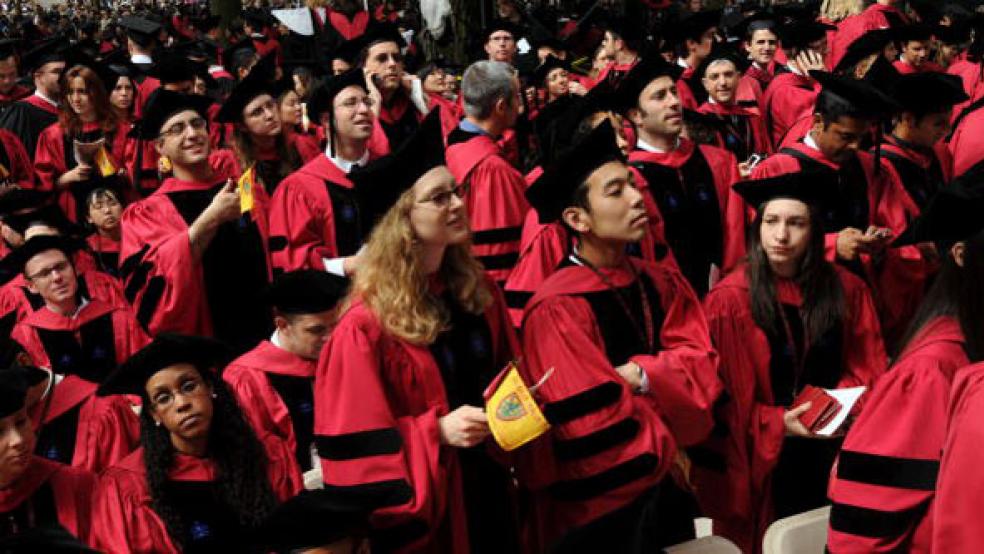If you want to know why Wall Street firms have been falling over themselves to change the way they treat new recruits—allowing employees to wear jeans at Barclays, discouraging weekend work at Goldman—look no further than the employment statistics for this year's crop of Harvard Business School graduates.
This year just 27 percent of newly minted Harvard MBAs took jobs in financial services, according to preliminary data from the school.
While finance remains the biggest destination for elite MBAs, it's a much smaller share than at any time in recent history. Even in the years immediately after the financial crisis, the sector's share of Harvard MBAs never fell below 31 percent.
So where are the graduates turning for jobs?
Increasingly, it's technology and telecommunications. From 2006 through 2009, this sector drew 7 percent of HBS grads. Tech's share then began rising, albeit slowly: To 8 percent in 2010, 11 percent in 2011, 12 percent in 2012. Then, last year, it jumped all the way to 18 percent.
RELATED: THESE WALL STREET JOBS CAN MAKE YOU FILTHY RICH
In other words, Wall Street appears to be losing its grip on the nation's best and brightest business students. More and more, tech is where it's at.
Far fewer graduates are going to investment banks. Investment banking's cut of the Wall Street share has fallen from a precrisis high of 12 percent in 2007 to 5 percent this year. And that isn't just an effect of the financial crisis. As recently as 2011, investment banks claimed 10 percent.
And it isn't just the big Wall Street banks that are seeing declines.
For several years following the crisis, private equity firms were taking a growing share of HBS graduates. Many Wall Street firms viewed these firms as their main competition for talent. Private equity hired 15 percent of HBS grads last year and just 10 percent in 2013.
Hedge funds held their 5 percent share, and investment management ticked up to 5 percent from 4 percent last year. Their combined share (Harvard's historical statistics combine them) is still below the precrisis high of 13 percent in 2007 and postcrisis high of 12 percent in 2011.
Venture capital remains tiny, with the same 1 percent share it has held for the past three years. Its high was 4 percent in 2008.
The catchall category of "other financial services" fell to 2 percent from 4 percent last year.
Ray Soifer, a former banking analyst and Harvard Business School alumnus, long ago came up with the idea of tracking the share taking what he calls "market-sensitive jobs." The careers of Harvard MBAs produce a "rather esoteric but nonetheless generally accurate long-term indicator of the U.S. equity market," he said.
RELATED: ON WALL STREET, FEWER JOBS BUT BIGGER PAYCHECKS
If 10 percent or fewer of HBS grads take market-sensitive jobs, that's a long-term buy signal, according to Soifer. If 30 percent or more take those jobs, it's a long-term sell.
This year is the first time since 2009 that the indicator has not been flashing a big red sell indicator. The market-sensitive jobs amounted to just 24 percent, compared with 31 percent last year and 35 percent in 2011. That doesn't put 2013 in Soifer's long-term buy category but does remove it from long-term sell.
One worry: Is the dramatic rise in the tech sector's share of Harvard MBAs a sign of a new tech bubble?
Read more at CNBC:
Why Obamacare Could Raise Your Premiums at Work

